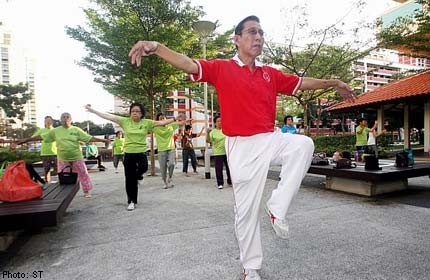Playing it safe

SINGAPORE - In his first year of retirement in 2004, Mr Chow Teng Lam did not go on an overseas holiday with his homemaker wife. The couple had been going on annual holidays before that.
Instead, the Chows, who live in a studio apartment, focused on ways to tighten their belts, even though they were quite comfortable financially.
Mr Chow, 69, a former operations manager in a shipyard, says: "Maybe it's because of my family background. My two siblings and I grew up in a cramped room in a shophouse in North Bridge Road and we have always felt a need to be careful with our money."
The father of three and grandfather of five downsized his car from 1,600cc to 1,400cc to save on petrol and insurance. He kept the car largely because he wanted to help ferry his grandchildren to and from school. He did not give up his credit card, largely because it gives him a 17 per cent discount on petrol.
Most of the time, he and his wife eat home-cooked meals comprising less expensive food such as batang instead of cod fish.
In the past, they would eat out twice a week, spending about $50 to $60 each time on meals at restaurants. They now eat out only once a week, spending at most $20 to $30 at higher-end food courts.
By the end of the first year of retirement, he and his wife managed to cut their expenses by about 20to 30 per cent, spending about $1,000 a month, and they have managed to keep at it ever since.
Although he was well prepared for retirement financially, Mr Chow says that in the first year, he was still worried if his retirement funds would last.
"I didn't exactly lose sleep over it, but it took a while for me to get used to not earning an income."
As early as when he was 50 years old, he had consulted a niece who worked in an insurance company about retirement planning. He bought a comprehensive health insurance for himself and his wife and used his Medisave to pay for the premiums every year. He and his wife are on medication for mild hypertension and diabetes respectively.
He also started to look at ways to generate passive income for himself after retirement. At age 55, he bought a "savings" insurance which would start paying him interest every year when he turned 60.
In addition, he topped up his CPF so that he would start to receive a monthly payout when he turned 62.
Since his retirement, which he opted for partly because he wanted to look after his grandchildren, his children have been giving him pocket money every month.
Hence, in his first year of retirement, he was receiving about $1,500 a month, about 30 per cent of what he used to earn. After the monthly CPF payout kicked in two years later, his monthly income went up to about $2,000.
"I should have enough to last me for another 20 years or so," he says.
His belt-tightening measures have not been taken at the expense of his enjoyment of life, he says.
As the vice-chairman of the People's Association's Active Ageing Council, he has been leading other seniors in qigong exercises for the last three years.
"There are ways to spend our time meaningfully without having to spend a lot of money," he says.

Get a copy of The Straits Times or go to straitstimes.com for more stories.